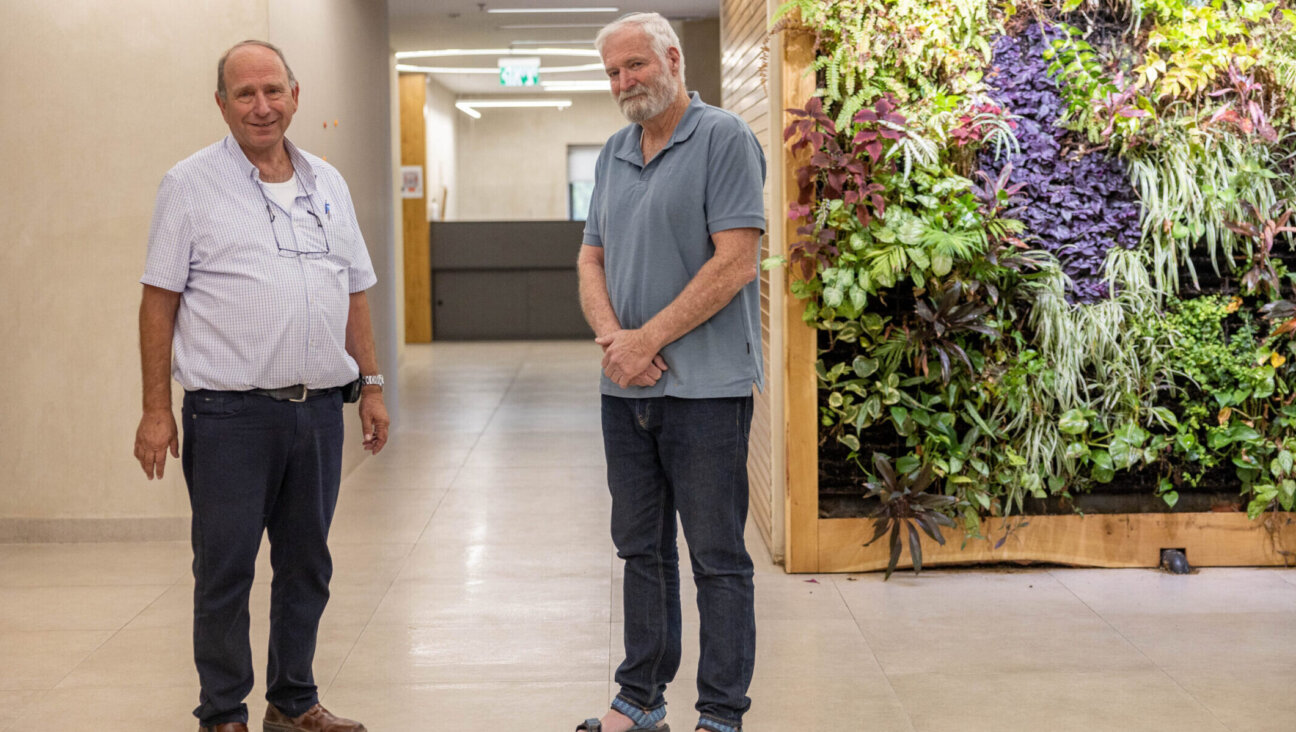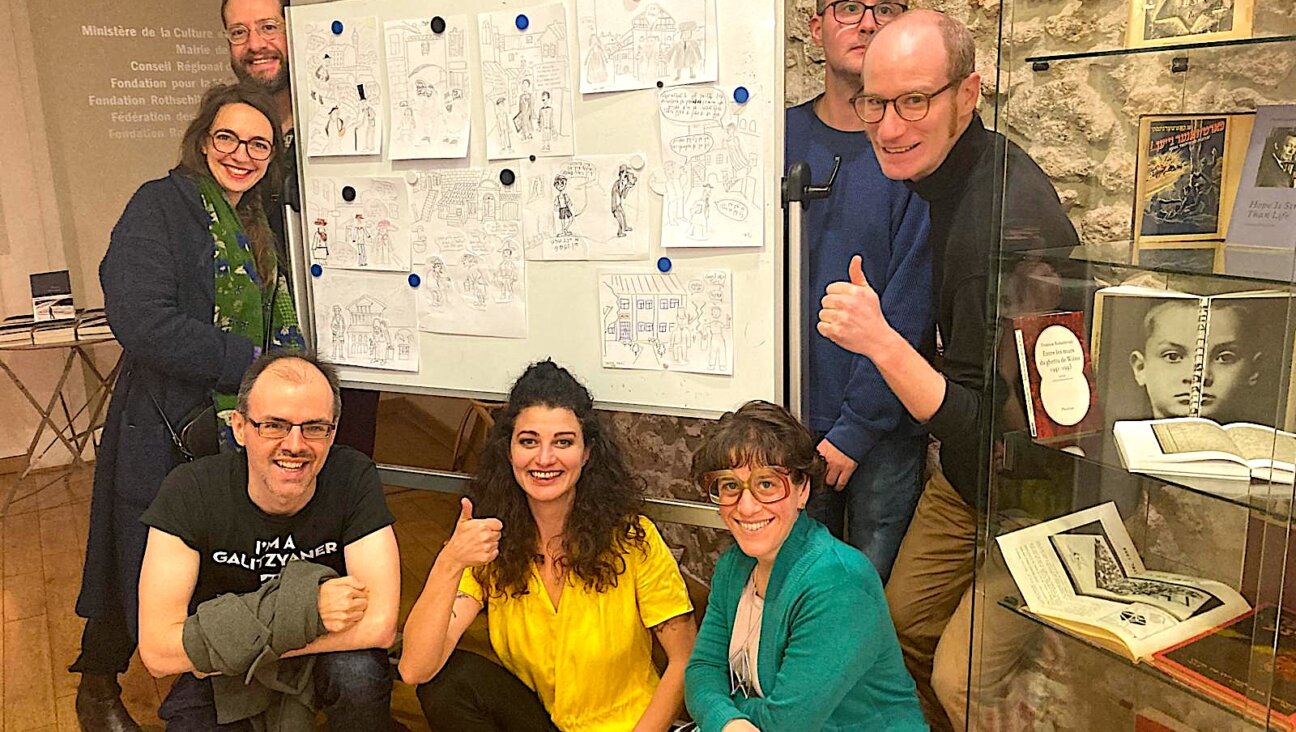Rescuing the Remnants of Iraq’s Jewish Community
At 3 a.m. on a hot June morning, Rachel Zelon set off from Amman, Jordan, on a 14-hour drive to Baghdad. Refugees, reporters and commercial trucks were lined up at the border, waiting to enter Iraq — after months in which all traffic had streamed in the opposite direction. Once inside the border, the convoy that Zelon had joined for protection made a brief stop so the travelers could put on bulletproof vests and helmets, in case any disgruntled Iraqis were planning ambushes.
“You didn’t drink any water,” Zelon told the Forward, “because there were no bathroom breaks before Baghdad.”
These tense hours were only the beginning of Zelon’s first journey to Iraq this summer. She was there on a one-woman mission to rescue the 34 Jews who remained in Iraq after the recent war, the last remnants of a Jewish community that numbered 150,000 in the 1940s. Zelon, the 44-year-old vice president of the Hebrew Immigrant Aid Society, aimed to find every one of the Iraqi Jews, many of them elderly and housebound, and offer them a way out: a plane ride to Israel.
From Iraq, Zelon made occasional phone calls to her agency’s American offices. Leonard Glickman, president of HIAS, said that the sound of shooting in the distance came through the fuzzy signal during those calls. “This was a pretty stark example of Rachel putting her life in harm’s way in order to rescue Jews in need in some far corner of the planet,” Glickman said. “She put herself last, and her job and these people first.”
From the safety of her office in New York this week, Zelon recounted her missions to Iraq.
With the funding of HIAS and the Jewish Agency for Israel, but traveling essentially on her own, Zelon made the first trip in mid-June, before most other aid agencies had set up shop. Upon arriving in the Iraqi capital, she immediately set out to find the Jewish dentist who had agreed to translate for her and help her navigate the city.
Their first stop was Baghdad’s Jewish community shelter, which had been built for the city’s indigent Jews. That adjective could have been used for most of the Jews remaining in Iraq, but when Zelon arrived, only two frail, elderly people were left, and the building was in shambles, with rotting food and pieces of ceiling littering the floor.
A blind, 70-year-old woman named Regina, whose back was nearly perpendicular to her legs, was the only occupant of the second floor. She spent most of her days slowly crawling up and down the stairs with buckets of water. Her dark room had no bed, and she slept curled up on the floor among piles of old clothing and trash. Pictures that Zelon brought back with her, shadows with only occasional streaks of light, hint at the deprived conditions.
Zelon had been on countless HIAS missions to help needy Jews in Latin America and the former Soviet Union, but she said that she had never seen such squalor. Other houses she visited were not much better.
“It was shocking,” Zelon said. “I’ve never seen Jewish people living in these conditions anywhere.”
In addition to poverty, Iraq’s remaining Jews were facing rising antisemitism, she said: “Under Saddam, anti-Zionism was rampant, but after Saddam it was just a free-for-all, and antisemitism burst out of control.”
Baghdad, she said, was rife with posters warning Iraqis not to buy from Jews or sell to them, and antisemitic conspiracy theories had become common fare at corner tea shops. Such antisemitism was so tangled up with resentment of Americans that being seen cooperating with a Westerner like Zelon could put anyone’s life in danger.
Consequently, Zelon tried to be as inconspicuous as possible. Within Iraq she stayed at a small hotel, away from the American compounds, and she avoided other aid workers whenever possible.
But if Zelon thought things were risky on her first trip, her second trip, in early July, showed her how much worse it could get.
“It was a matter of three weeks, and I wouldn’t go on the street by myself anymore,” she said. “The elevation in the hostility toward foreigners was palpable.”
On a 120-degree day during her July visit, Zelon set out from Baghdad in a ramshackle Iraqi car without air-conditioning to the city of Basra, where she hoped to find a 95-year-old woman named Salima. Because Salima was on only one of the lists drawn up by Iraqi émigrés in Europe, Zelon was not sure she existed.
When Zelon arrived in Basra, she found a Syrian Orthodox priest who had brought Salima food and water in the past. While leading Zelon to Salima, he protested that he had done all he could for the woman, and when they came upon her house, Zelon understood why he was defending himself.
“Her house had fallen down around her,” Zelon said. “It was full of cats and pigeons, and no water. Somehow she had kept a room intact for herself.”
Zelon sat down on the filthy floor and said to Salima, “I’m Jewish, and I’ve come to take you home.”
Immediately, Salima broke into tears.
“I thought everyone had forgotten about me,” Salima told her. “My sisters and my brothers all live in Israel, and I’ve wanted to go there, but I haven’t known how to get there.”
Salima, however, was one of the few people to accept Zelon’s offer so readily. Most of the Jews were too old to embrace the idea of change. Broken-backed Regina would not even move to a room on first floor of the Jewish shelter in Baghdad to avoid the agonizing stair climb.
Only six of the Iraqi Jews decided to go with Zelon; 28 others stayed behind, two of whom have since died. Zelon has arranged for a representative of the Joint Distribution Committee to look after the remaining 26 Jews. But she will not leave it at that. She has heard that a number of them are now interested in leaving.
“I promised them I would help them leave if they want to,” Zelon said, hesitant to discuss specific arrangements, out of concern for their safety.
A message from our CEO & publisher Rachel Fishman Feddersen

I hope you appreciated this article. Before you go, I’d like to ask you to please support the Forward’s award-winning, nonprofit journalism during this critical time.
We’ve set a goal to raise $260,000 by December 31. That’s an ambitious goal, but one that will give us the resources we need to invest in the high quality news, opinion, analysis and cultural coverage that isn’t available anywhere else.
If you feel inspired to make an impact, now is the time to give something back. Join us as a member at your most generous level.
— Rachel Fishman Feddersen, Publisher and CEO






















